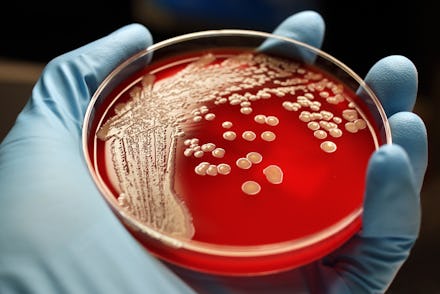The WHO Released a Report About Superbugs, and the Result Is Out of a Sci-Fi Horror Film

The news: For years, scientists have warned that excessive antibiotic use will lead to the rise of powerful superbugs that can resist the strongest medications that modern science has to offer. Seems kind of like a far-fetched sci-fi horror story, right?
Wrong.
According to a new report by the World Health Organization (WHO), that chilling prediction is becoming a reality. For its first global study on antibiotic resistance, the WHO analyzed data from 114 countries and found that dangerous superbugs already exist all over the world.
"The world is headed for a post-antibiotic era, in which common infections and minor injuries which have been treatable for decades can once again kill," said Keiji Fukuda, the WHO's assistant director-general for health security.
Image Credit: Getty
Why is this happening? Evolution. Antibiotics are often overused and misused for mild ailments, and over time various strains of bacteria have learned to adapt to these medicines and resist their effects. Now, they have become immune to even so-called "last minute" antibiotics, which are often saved for extreme cases.
The most famous of these superbugs is MRSA, which kills 19,000 Americans every year. The bacteria usually spreads in hospitals, which have become antiseptic breeding grounds for these dangerous strains.
And already, drug-resistant strains of previously treatable diseases are quickly spreading around the world. At least 10 countries now have a completely untreatable strain of gonorrhea, and in some countries, nearly half of pneumonia and E. coli patients no longer respond to antibiotic treatment.
Image Credit: Getty
What can be done? If these superbugs continue to spread, medications that were once effective would become obsolete, and diseases that were considered harmlessly commonplace would turn deadly. And pharmaceutical companies cannot keep up with the rapid growth of these drug-resistant bacterial strains. There hasn't been a new class of antibiotics in 25 years, and introducing new, powerful drugs might just fuel this vicious cycle even further.
For now, the best way defense is for everyone, both humans and livestock, to stop overusing antibiotics. "Unless we take significant actions to improve efforts to prevent infections and also change how we produce, prescribe and use antibiotics, the world will lose more and more of these global public health goods and the implications will be devastating," said Fukuda.
That requires a global change in behavior. Doctors have to be more discerning when it comes to prescribing antibiotics, and patients need to stop sharing their antibiotics with others, or taking leftovers from a previous prescription. If we don't stop unnecessarily killing these bacteria, soon enough we'll create bacteria that will be impossible to kill.